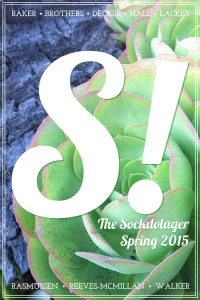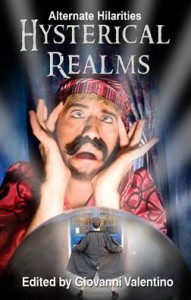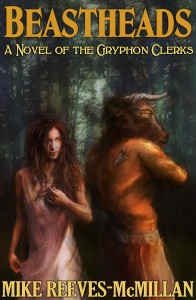I’ve been writing the Gryphon Clerks series, which is secondary-world fantasy, for a while now. I did a lot of worldbuilding for it upfront (originally, I planned it as a game setting, but it kept generating stories, and games are hard). It’s very much a distinct world, with a lot of specific differences from our world that I have to keep in mind when I write. For example, there are no pigs, and no New World plants or animals. The calendar is completely different. The counting system is different. The way society is structured, the names for common things (even marriage)… I have to keep constantly alert to avoid breaking my own canon by writing sentences like “She got married last month”.
Now, I’m not saying that a secondary-world setting doesn’t have advantages. It opens up possibilities that are closed off if you set a story in our world, just because our world has things that are true of it that you can’t ignore. In a secondary world, I can outright make things up if it suits me, and I don’t have to do much research (I do a little research occasionally to give me an idea of whether things are basically credible or reasonable, but I’m not bound by the results.)
At the same time, setting a story in a version of the real world means a lot of work is already done. I don’t have to invent all the technology from scratch, all the history from scratch, all the sociology from scratch. I may need to research it a bit, but that isn’t especially hard, thanks to Google. And I don’t have to invent cultural references; I can make pop culture jokes, which is something I can only do indirectly in secondary-world fantasy. (My current WIP has a Bechdel Test joke embedded in it, but it would be easy to miss.)
One of my projects this year is an urban fantasy. I’ve written the first chapter and done some planning of things I’d like to include – one of them is an action set-piece that takes place along the route I walk to work, which will be great fun. But, while it seems like urban fantasy would require a minimum of worldbuilding, there are actually a number of questions that I have to ask myself about the world, and that any urban fantasy writer has to answer, even if only by implication.
I thought I’d work through them in a blog post, so that other people could see my process. I’ll use some of my favourite (and one or two of my non-favourite) urban fantasy series as examples, and I’ll make my decisions based, in part, on what opportunities it offers me for setting up conflicts and developing a series over time.
1. Out, or Masquerade?

The term “masquerade” (in this context) comes from the game Vampire: the Masquerade, in which it means the conspiracy by which the vampires conceal their existence from the world at large. One of the key questions of urban fantasy is whether people in general know that magic, the supernatural, and/or the various races (vampires, fae, werewolves) exist. In Jim Butcher’s Dresden Files, so far at least, they don’t know (though it’s largely through natural human rationalisation, rather than any particular conspiracy, that they remain ignorant). In Carrie Vaughn’s Kitty Norville books, they do know, as of early in the series, and Kitty was involved in the outing process (not by her choice). In Patricia Briggs’ Mercy Thompson series, we have a middle ground: werewolves are out, fae are out, but vampires remain unrevealed to the populace at large, and everyone wants to keep it that way to avoid a panic.
One of the consequences of this question is that if the existence of the supernatural isn’t common knowledge in the world, preserving the secret – or, alternatively, the secret coming out – may become a plot driver. A series can even be partly driven by successive outings, as the Mercy Thompson series is.
If the supernatural is out, on the other hand, that’s a difference from our world, and we need to think about the consequences. In the Kitty Norville books, for example, there are people (often religious) who see the supernaturals as inherently evil and to be destroyed. There will generally be a government response (this can exist even where the secret is hidden from the population at large, of course), and government agents from an agency that deals with the supernatural are likely to show up and do what government agents do. The main character may even be a part of such an agency.
Since scientists tend to write hard SF rather than urban fantasy, the scientific study of the supernatural tends not to be a huge emphasis, though in my opinion it would be a big consequence of open, undeniable supernatural phenomena. There are sometimes sinister labs which want to vivisect the characters, but there isn’t a lot of in-depth “this is what it’s like to be a scientist in a world where there’s magic”, probably because that’s complicated to work through and risks the fragile suspension of disbelief that you’re working hard to create in the audience. I’m noting that as a potential avenue for future exploration. I can imagine a scientist in a world where the supernatural exists, but isn’t public knowledge, coming across unambiguous supernatural phenomena and being torn between wanting to study and understand this fascinating new thing, and the knowledge that attempting to publish any findings will probably end his or her career.
Because that seems like a cool idea, and because starting with the supernatural hidden gives more scope (after all, I can always have it come out later, whereas I can’t start with it out and then later have it be hidden), I’m choosing to make my world one in which magic exists, but isn’t generally known or acknowledged.
New, or Always There?
If magic, the supernatural, or whatever exists, has this always been the case? Or is it a recent emergence (or re-emergence)? And if it’s always been there, why isn’t it generally known?
In some series, like Ilona Andrews’ Kate Daniels, magic has started up relatively recently, as part of a more-or-less apocalyptic event. In most, though, magic has always been there. Kim Harrison has a dollar each way, and has her apocalypse kill off a lot of normals so that the magicals are now a substantial enough majority that they feel safe coming out (though they were there all along).
To me, if magic has always been around, you need to give at least some thought to a secret history of the world in which magic featured significantly in historical events, and also to historical practitioners of magic. Most urban fantasy magic is more or less made up wholesale, or based on modern “witchcraft” or New Age practices (but I repeat myself). There’s a long and fascinating history of real-world attempts at magical practice, though, and it seems a pity to throw it all away (particularly since I know enough about it to fake my way through it in a manner that should convince most non-experts, which is as much expertise as I care to develop).
Here’s my decision, then: magic has always been around, always been a human potential, but the ways in which it was done historically were flawed or simplistic in similar ways to how, say, chemistry was done in the same periods. People were able to achieve useful effects, but without really understanding why things worked, and sometimes they put things into the process that really made no difference, because of that lack of understanding. As of relatively recently, people started getting good at magic (ironically, because of a more scientific mindset, in which they set out to understand why things worked through an experimental process). However, there’s still not a comprehensive theory. It’s more like magic’s early 19th century than its 21st, and it’s more engineering than science.
One of the things that enables is that magic use itself, not just the characters’ ability to use magic, can grow and develop in the course of a series. They can come up with new ways of doing things that nobody has ever thought of before (and that the author didn’t think of earlier on, even if they would have been handy – in fact, the earlier problem that could have been solved by a particular bit of magic can be the stimulus to develop that solution). Most urban fantasy series have a static magic system, already as good as it’s getting, so to introduce a new thing involves introducing a new (usually) antagonist who’s a different kind of fae or whatever.
And speaking of fae:
What Supernaturals Exist?
Jim Butcher’s Dresden Files spends the first few books setting up the many different supernatural beings in his world. Wizards, werewolves, vampires, ghosts, fae, the undead, and the Knights of the Cross/Order of the Blackened Denarius each get a book, and for a while they rotated, so we’d get a book in which the werewolves featured (but not the fae or the knights), and then one in which the knights featured (but not the werewolves), and so on. These days, he’s mixing them up more.
This makes for a rich world, but it’s a lot to manage. Some series just have a bunch of diverse fae. Others are all vampire, all the time. It’s unusual to have werewolves (or other shifters) without vampires, but I’m sure it’s been done.
Alternatively, you can have just one supernatural, like the djinn in Rachel Caine’s Weather Warden series (arguably, the Wardens are a second kind of supernatural, in that they’re humans who can work with the djinn).
My inclination at the moment is to go with just the magic, not the creatures. I’m tired of vampires and shifters, and they’re pretty hard to justify if I’m going to have any science in the story, which I do plan to. (I have some university-level training in life sciences; high school chemistry; and as much physics as the average nerd picks up from reading a lot of SF and some nonfiction. That is, if anything, more than enough for writing urban fantasy, and I expect it to hinder more than it helps, to be honest with you.)
At the same time, I do have an idea (which probably won’t go in the first book) about what the demons/angels are that medieval and renaissance European magicians were summoning and talking to. At least, I have an idea for a theory that a character has, a theory which may well turn out to be mistaken. And I don’t guarantee that there won’t be lycanthropy spells (that don’t cause physical transformations, only mental ones), or entities that feed off others that are hosted by humans, give them superhuman abilities, and are transferred by feeding, but are totally not vampires. As for the fae, I tend to think of them as extradimensional aliens anyway, and while at the moment that’s not an idea that I’m excited about for this setting, I’m not ruling it out.
Initially, though, it’s just human magic-users. Which leads to the question:
Training or Genetics?
Can anyone, more or less, learn to do magic? Or is it something you’re born with or without?
J.K. Rowling’s Harry Potter series is one in which the inherited ability to do magic is a significant plot driver, because it’s a basis for discrimination. There are “muggles”, who have no magic, can’t see it, can’t do it. There are wizards and witches, who have magic and can do it. But there are “muggle-borns”, whose parents aren’t magical, but they are; and there are “squibs”, vice versa. I’m sure someone has worked out the genetics somewhere. (Yep, sure enough.) In Mendelian genetics, an offspring either does, or does not, have a simple heritable trait (there is no try), but most significant human abilities, like intelligence, involve multiple genes. Even eye colour does.
Most fantasy (urban or secondary-world) that involves magic, in fact, assumes that there are magical haves and have-nots, and vaguely indicates that this is somehow based on genetics. I like to use the parallel of musical ability. Some people have none at all (though they don’t always know it, as American Idol auditions prove every year); some have enough to sing in tune in a choir; some are musical geniuses. It’s heritable (nearly 50%, which is very high, according to this article), improves with certain kinds of training, and so forth. Because it’s so heritable, it’s presumably getting more common in the population over time, as well – any geneticists want to correct me on that one?
This excellent post on statistical patterns by Yonatan Zunger suggests that a biologically-based ability will usually form a power law: there will be a few people with a lot of it and a lot of people with a little of it, and a fairly steep drop-off between the two. Right there, you have a have/have-not situation, with a few powerful people and a lot of lesser talents, and this is a great setup for conflict (and you can use it as a political metaphor, which I happen to think is cool). And as part of the trope-aversion part of my project, I’m not choosing, as my main character, one of the super-powerful, exceptional people, but someone further down the slope of the curve, who has to work damned hard and apply a lot of intelligence to survive in a world where there are people a lot more powerful than she is.
So, How Does Magic Work?
There are several parts to the “how does magic work?” question. There’s the sciency part, which at the moment for me is a vague and handwavey “human consciousness meshes with the quantum mumble mumble and look, over there, a squirrel!”. This should be sufficient to get an urban fantasy going; most urban fantasy series never even address the question.
There’s the “what can you do with it?” part, and here I’m thinking that you can affect:
- movement of matter – so telekinesis, etc.
- movement of energy – heating, cooling, slow or sudden
- electromagnetic fields and patterns (this will be a big one – one of the characters I have in mind is an electromancer)
- human minds – think pulp hypnosis, which is different from real hypnosis
- biological systems – up to and including healing, but you can do various kinds of enhancement and, of course, harm
As it happens, those (plus time and space, which I haven’t really played with yet) are more or less the categories of things that magic can affect in my Gryphon Clerks novels, so I’m clearly going to have to re-skin it. Which leads to the last version of “how does it work?”: “what does it look like?”
Remember, we’re at a kind of early-19th-century-science level of understanding and use of magic. There’s a history and a tradition. And magic works by the human mind interacting with the structure of the universe, so magic tends to work best when you use your own system of symbology, whatever that may be. Some people use a very precise, structured, traditional set of symbols, though most magic users realise that the traditional methods are full of unnecessary flounces. Some draw only on one symbol set; others are more pick-and-mix. Essentially, magic consists of ordering your will and mental effort in such a way that it will produce the desired effect (and only that effect) in the world, by whatever means works for you. Some people’s magic is sloppy, and has unintended side effects; that’s also likely to happen if you cast on the fly and in a hurry. Some can produce a wide range of effects, while others can only do a couple of reliable spells. Some people make up their own spells (they’re like cooks who create their own recipes), others can only work from an existing spell, or with a pattern that’s been laid out for them in some object – I suppose that last one is like making a meal from a packet.
My Setup
So, what’s the story going to look like? What characters fall out of that setting?
Tara is an artist who creates magic items for other people to use, working with Celtic design elements. Sometimes, the way that they use the items causes problems for her. This is the situation in Chapter 1: some more-powerful magic user is about to send her a goon-o-gram about how annoyed he is with one of her customers.
Tara’s friend/sidekick/cotagonist/definitely-not-love-interest, Sparx the electromancer, does something similar to her in a completely different way. He has very little raw power, even less than she does, but has learned to use it precisely to create complex effects. Warned by one of his clients about the hit on Tara, he warns her in turn, and helps her to deal with the attacks.
The third in the trio, Steampunk Sally, has a minor talent for seeing a few seconds into the future (magic sometimes throws up these oddities) – and a reckless nature which tends to get them all in trouble, because, despite her ability, medium-term consequences tend to elude her in her decision-making process. She’s the client who has caused the issues for Tara.
My current draft of Chapter 1 is here.
Want to be kept informed about progress on the book, and when it will be available? Sign up in the sidebar (make sure to leave “Occasional blog posts” checked).
(Update: the series is called Auckland Allies, and it has its own section of the site now.)





